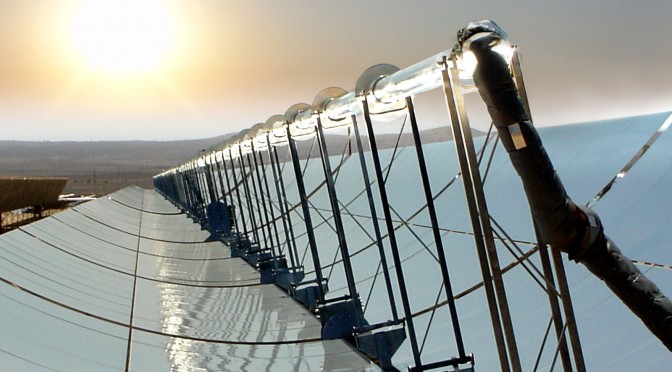Dr. Chiesa prides himself on extensive industrial experience with the development of concentrated solar-thermal power (CSP) plants in the UAE.
Masdar Institute of Science and Technology, an independent, research-driven graduate-level university focused on advanced energy and sustainable technologies, today announced one of its faculty provided an overview of the Institute’s role in addressing the challenges to deploy solar technologies in the UAE where the industry is taking its initial steps.
Dr Matteo Chiesa, Associate Professor – Mechanical Engineering/Materials Science and Engineering, presented the Australian scientific community with details on the research in solar energy being conducted at the Laboratory for Energy and Nano Science (LENS) at Masdar Institute. The research at LENS focuses on nano-scale energy transport, conversion, and storage, and on the application of nanotechnology towards the development of novel power generation devices and/or systems based on renewable energy sources.
The invitation to Dr Chiesa to participate in the events was extended by the Commonwealth Scientific and Industrial Research Organization (CSIRO), the biggest research organization in Australia and the Australian Solar Energy Association, in recognition of the collaborative efforts at LENS among Dr. Peter Armstrong, Dr. Marco Stefancich, Dr. Hosni Ghedira and Dr. Amal Al Ghaferi. Dr Chiesa’s visit to Australia came under the CSIRO OCE-sponsored ‘Cutting Edge Science’ program.
Dr Fred Moavenzadeh, President, Masdar Institute, said: “Presenting our unique research offerings at global platforms further reiterates Masdar Institute’s status as a world-class research-based institution with top caliber faculty. Dr Matteo Chiesa’s extensive knowledge reflects his industrial experience that guides the students at Masdar Institute as directed by the country’s leadership. We believe the delegates at the symposium received greater insights into the solar energy technologies that are being researched at Masdar Institute and others that are implemented in the UAE.”
Dr Chiesa offered three presentations, including the one that focused on ‘Solar Energy Deployment in the UAE: The role of the Masdar Institute’, at the Sydney branch of the Australian Institute of Energy (AIE). The presentation was organized in collaboration with the Clean Energy Research Cluster of the Faculty of Engineering at the University of Sydney. During his speech, Dr. Chiesa provided the rationale behind some of the decisions taken in realizing the first concentrating solar power (CSP) plant in the UAE.
At CSIRO, Australia’s national science agency, Dr. Chiesa highlighted Masdar Institute’s unique research agenda. Speaking on ‘Material Challenges in Developing Solar Power Generating Systems’ and ‘On the role of material science in the design of beam down solar thermal tower technologies.’, Dr Chiesa covered various key areas in the implementation of solar energy technologies presenting novel pathways that include beam splitting and photonic crystals’
Underlining the need for local expertise to implement smart designs under local conditions, Dr Chiesa argued progress in renewable energy requires a holistic approach to the energy challenges, as envisioned by Masdar Institute. He said: “Solar power generation cost/resource tradeoffs are site specific, making local expertise the only route for the industry to flourish. Variations in solar radiation incident at the Earth’s surface due to the effect of aerosols profoundly affect the profitability of concentrating solar technologies, and needs to be assessed so that solar collector design can be optimized for specific regional conditions.”
He also observed that the ‘beam down concentrator’ is a unique teaching facility where students and researchers can experience the local challenges related to the implementation of concentrating technologies in the UAE.
Emphasizing the outcomes of the research on beam down, Dr Chiesa stressed the philosophy of developing the beam down concentrator further with an effort towards the study of light matter interaction and with the objective of combining the advantages of the quantum and thermal pathways to develop a disruptive solar energy conversion technology. Delving deeper into in the science and the extensive use of atomic force microscope (AFM) at LENS, Dr Chiesa focused on the affinity of water at the nano-scale to develop functionalized surface that can reduce the overall use of water to clean solar collectors.
Dr. Chiesa received his Master’s degree and Doctorate from the Norwegian University of Science and Technology. In addition to his academic profile, Dr. Chiesa prides himself on extensive industrial experience with the development of concentrated solar-thermal power (CSP) plants in the UAE, on-board seismic ships and production platforms. Such experience is extremely useful to define and address the challenges that the energy industry is facing. Dr. Chiesa’s research expertise belongs to the energy domain and exemplifies his effort in providing a holistic view to different problems within the energy domain.
Established as an on-going collaboration with the Massachusetts Institute of Technology (MIT), Masdar Institute integrates theory and practice to incubate a culture of innovation and entrepreneurship, working to develop the critical thinkers and leaders of tomorrow. With its world-class faculty and top-tier students, the Institute is committed to finding solutions to the challenges of clean energy and climate change through education and research.


